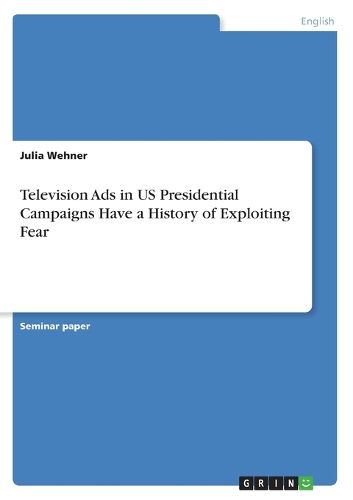Readings Newsletter
Become a Readings Member to make your shopping experience even easier.
Sign in or sign up for free!
You’re not far away from qualifying for FREE standard shipping within Australia
You’ve qualified for FREE standard shipping within Australia
The cart is loading…






Seminar paper from the year 2011 in the subject English Language and Literature Studies - Culture and Applied Geography, grade: 1,7, University of Duisburg-Essen, language: English, abstract: Election campaigns are common rituals in democracies. Politicians try to persuade voters in order to be elected. Therefore, political candidates usually make use of professional campaigning strategies that involve the television as the most important medium. Since the 1960s US presidential campaign ads on TV have been increasingly successful and cutting-edge. They sometimes were so convincing they even swung a decision. Over the last decades the predominant topics in US federal politics were the Cold War as well as national security and the US military. In 1964 the presidential election campaign was highly influenced by the escalating situation in Vietnam and the general disquiet caused by the arms race and nuclear weapons. The American psyche was collectively anxious about the latent atomic menace so it suggested itself to address fear in a presidential campaign ad. The Nixon campaign 1972 dealt with one of the genuine Republican topics: Military. Due to its success it was remade in two subsequent campaigns called Tank Ride in 1988 for George Bush and 2004 in Weapons Florida for George W. Bush. The latter will be examined in this paper, too. However, there are different approaches to persuade the voting public; one of the most favorable techniques is playing on the people’s emotions. Thus, it is not surprising that US presidential campaign ads have a history of exploiting fear in television ads. It leads from 1964 until 2004 and aims at persuading voters by the well-directed use of sounds, images and language.
$9.00 standard shipping within Australia
FREE standard shipping within Australia for orders over $100.00
Express & International shipping calculated at checkout
Seminar paper from the year 2011 in the subject English Language and Literature Studies - Culture and Applied Geography, grade: 1,7, University of Duisburg-Essen, language: English, abstract: Election campaigns are common rituals in democracies. Politicians try to persuade voters in order to be elected. Therefore, political candidates usually make use of professional campaigning strategies that involve the television as the most important medium. Since the 1960s US presidential campaign ads on TV have been increasingly successful and cutting-edge. They sometimes were so convincing they even swung a decision. Over the last decades the predominant topics in US federal politics were the Cold War as well as national security and the US military. In 1964 the presidential election campaign was highly influenced by the escalating situation in Vietnam and the general disquiet caused by the arms race and nuclear weapons. The American psyche was collectively anxious about the latent atomic menace so it suggested itself to address fear in a presidential campaign ad. The Nixon campaign 1972 dealt with one of the genuine Republican topics: Military. Due to its success it was remade in two subsequent campaigns called Tank Ride in 1988 for George Bush and 2004 in Weapons Florida for George W. Bush. The latter will be examined in this paper, too. However, there are different approaches to persuade the voting public; one of the most favorable techniques is playing on the people’s emotions. Thus, it is not surprising that US presidential campaign ads have a history of exploiting fear in television ads. It leads from 1964 until 2004 and aims at persuading voters by the well-directed use of sounds, images and language.